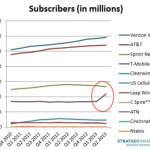by Tim Weinhold
(Originally published April 19, 2013)
Not long ago business headlines called our attention to the fact that one of America’s iconic companies, Boeing, is in crisis. The FAA grounded its new flagship airplane, the 787 Dreamliner. International regulators followed suit. The immediate cause of the grounding is a lithium-ion battery fire and related incidents of battery overheating. There have been other troubling malfunctions as well, including various electrical problems, brake problems, a fuel leak, a cracked windshield — and one emergency landing in Japan. Further 787 deliveries are on hold, and order cancellations are an imminent possibility. Depending on how quickly, and affordably, the battery problem(s) can be solved, Boeing’s survival may even be in jeopardy.
This is hardly the first indication of problems associated with the 787. The first planes were delivered over three years late, and the delivery schedule has been pushed back at least seven times. A recent Seattle Times report, written before the battery crisis, indicates that technical issues may lead to two more years of delay. And cost overruns are equally serious. The original development budget for the plane was $5 billion. Analysts now estimate the actual cost will come in at between $12-18 billion.
So how did Boeing get into this mess? Analysts are all in consensus that the heart of Boeing’s troubles lies in an overly aggressive, and poorly managed, approach to outsourcing. In the past, Boeing outsourced manufacturing but maintained tight control over design. As Peter Cohan notes in Forbes, that allowed the airline
“to make sure that the pieces that other companies made would fit together well because Boeing engineers understood what each part would do and how they would interact when the plane was flying. But with the 787, Boeing departed from this approach. Instead — to save money and supposedly to boost quality and speed time to market — Boeing outsourced 60% of the design and manufacture to suppliers.”
Now Boeing is finding that many of those suppliers were unequal to the task. In fact, Boeing had to spend a billion dollars to buy one of its critical suppliers just to begin to rectify the weak link it had proved to be in their 787 supply chain.
A biblical understanding of business purpose and practice could have kept Boeing from the trouble, in fact, the grave danger, in which it finds itself. God’s divine intent and reference point for all conduct, all human endeavor — business included — is summed up in a single word: Love. As Jesus points out, the two Great Commandments are “’Love the Lord your God with all your heart and with all your soul and with all your strength and with all your mind’; and, ‘Love your neighbor as yourself.’” (Luke 10:27) In fact, Scripture often conflates these two, teaching that the paramount way we love God is, in fact, by loving our neighbors. So Paul says in Galatians 5:14, “The entire law is summed up in a single command: ‘Love your neighbor as yourself.’” and James writes in chapter 2, verse 8: “If you really keep the royal law found in Scripture, ‘Love your neighbor as yourself,’ you are doing right.”
Much has been written on what ‘loving your neighbor as yourself’ really means. Some of that discussion is, theologically and psychologically, both subtle and complex. Permit me to simplify. There are two opposed ways to think about, and act on, one’s own self-interest in relation to the interests of others. We might label one viewpoint ‘win-lose.‘ That viewpoint sees one’s own interests and those of others as characteristically in conflict, a conflict that we reflexively seek to win. That is the default mode of human perception and behavior.
Scripture calls us to an alternate and higher view, what we might label ‘win-win.’ In this view, the importance of our neighbor’s interests is made equal to our own. If on a given issue the outcome we want represents a ‘win’ for ourselves but a ‘loss’ for our neighbor, then that outcome fails the ‘royal law of Scripture.’ God’s mandate compels us to look for a better solution, one that represents a ‘win’ for our neighbor as well. Maybe further effort will reveal a new pathway, an entirely better solution. Or maybe we must simply scale back our own desires and adopt a compromise that improves our neighbor’s outcome. But Scripture is clear, only ‘win-win’ outcomes, not ‘win-lose’ outcomes, live up to God’s ‘love your neighbor as yourself’ mandate.
Now back to Boeing. For the sake of argument, let’s assume that when Phil Condit, et al, decided to commit Boeing to a much more aggressive outsourcing scenario, he was not mesmerized by the stock gain windfall he would reap from bringing a dramatic cost-savings/profit-boosting story to Wall Street. Let’s be optimistic. Let’s hope Condit legitimately tried to weigh the risks and rewards of Boeing’s traditional approach versus the new, more aggressive outsourcing option. (Otherwise we are faced with the prospect of a major company CEO who, for the sake of personal gain, gambled with the very survival of his company.)
Understood purely in those risk-reward terms, not an easy decision. Clearly there were real risks associated with more-aggressive outsourcing, risks that now look extraordinarily dangerous. But there was also the prospect of considerable reward to Boeing and its owners. So, tough decision, right?
But not so tough with the benefit of Scripture’s ‘love your neighbor’ win-win counsel. Suppose Condit had asked himself questions like the following. If aggressive outsourcing works as well as we hope, Boeing and its owners will benefit greatly, but:
- Will aggressive outsourcing also benefit our employees, i.e., will it represent a ‘win’ for them as well?
- What about the impact on the many host communities in which we are located, will aggressive outsourcing be a ‘win’ for them?
- What about for America, for the country who, in many ways, made (and continues to make) Boeing possible, will our aggressive outsourcing represent a ‘win’ outcome for our nation?
I suspect an objective Condit wouldn’t have found these difficult questions to answer (again, provided he was not simply intent on personal stock price rewards). For employees, for host communities, and for its host country, Boeing’s decision to chase (the prospect of) higher profits through aggressive outsourcing represented the epitome of a ‘win-lose’ decision. Boeing and its owners might win, but its business ‘neighbors’ all were likely to lose. Scripture’s counsel would have warned Condit away from a pathway that now threatens to make Boeing and its shareholders the biggest losers of all.















